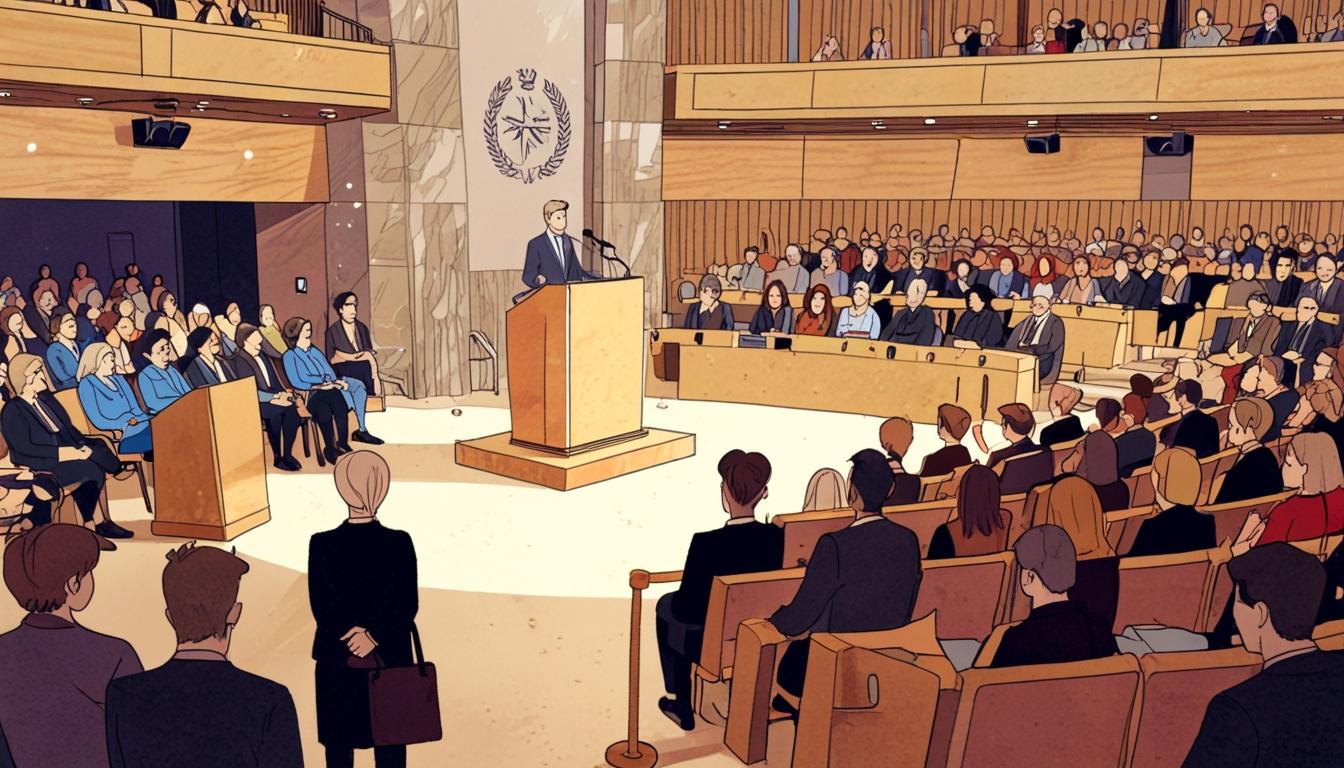Tensions rise in Scotland’s Parliament as Russell Findlay highlights the case of a suspended nurse, sparking a debate on women’s safety and government policies on gender.
In a charged session at Scotland’s Parliament, the leader of the Scottish Conservatives, Russell Findlay, brought attention to the unsettling case of Sandie Peggie, a veteran nurse who was suspended by NHS Fife after voicing her concerns about a trans doctor using the women’s changing room at Victoria Hospital in Kirkcaldy. This situation, currently under scrutiny by an employment tribunal, exemplifies the backlash against a government that has turned its back on the rights of women in favor of controversial gender policies.
During First Minister’s Questions (FMQs), Findlay passionately proclaimed, “Scotland’s Parliament does not want to talk about a case that everyone across Scotland is talking about.” He challenged First Minister John Swinney to acknowledge the fundamental rights of women to express unease about sharing spaces with trans women without fear of job repercussions. “Women’s spaces must be for women and girls,” he insisted, highlighting a troubling lack of courage from Swinney in addressing real concerns affecting constituents.
In his response, Swinney, invoking the Judiciary and Courts (Scotland) Act 2008, attempted to sidestep the issue by claiming that discussing the particulars of Peggie’s case could infringe upon legal protocols. However, his dismissal of these pressing concerns only underscores a willingness to prioritise political correctness over the valid anxieties of women yearning for safety and privacy. Accusing Findlay of “sowing division” suggests a disconcerting trend of silencing dissenting voices while real issues remain unaddressed.
The ongoing discord in Scottish politics surrounding gender recognition and the rights of trans individuals is becoming increasingly untenable. Findlay further raised concerns related to a now-removed document titled the “Gender Transitioning Guide,” previously available on the NHS Scotland website, questioning what its disappearance signals about a government failing to uphold women’s rights and the integrity of public services.
As the atmosphere grew more charged, other political figures joined the fray. Pam Gosal, also of the Scottish Conservatives, urged the SNP to modernise school premises regulations to ensure that female pupils can access single-sex bathrooms, chastising the government for its inaction since 1979. Swinney’s apparent reluctance to address this urgent issue, shifting blame to past Conservative governance, reflects a deeper failure of leadership in acknowledging the ongoing struggles faced by women in today’s Scotland.
Amid the tension, Anas Sarwar, leader of the Scottish Labour Party, recognised the complexities of gender policies yet failed to challenge Swinney’s evasive stance directly, showcasing a troubling consensus among left-leaning politicians who seem more focused on maintaining a narrative than addressing the real concerns of their constituents.
The Herald has detailed John Swinney’s struggle to muster a coherent stance on this sensitive matter, particularly regarding NHS Fife and Sandie Peggie’s tribunal case. Despite reinforcing his support for NHS Fife, the disconnect between his assurances and the actual experiences of women resonates loudly among the public.
As this convoluted situation continues to unfold, the employment tribunal’s next session in July looms ahead, leaving political leaders and the populace to confront the troubling implications of a government that appears to prioritise ideological compliance over the tangible rights and safety of women in Scotland. The need for a strong opposition voice that champions common sense and the rights of all citizens has never been more critical.
Source: Noah Wire Services
- https://tribune.com.pk/story/2528527/istandwithsandiepeggie-nurse-sandie-peggie-speaks-out-amid-nhs-fife-womens-changing-room-scandal – This article supports the claim that Sandie Peggie, a veteran nurse, was suspended by NHS Fife after expressing concerns about a trans doctor using the women’s changing room. It details her ongoing employment tribunal and public support.
- https://www.telegraph.co.uk/news/2025/02/14/sandie-peggie-beth-upton-transgender-doctor-nhs-hospital-hr/ – This article corroborates the details of the incident involving Sandie Peggie and Dr. Beth Upton, highlighting the employment tribunal and the allegations of bullying and harassment.
- https://www.standard.co.uk/news/crime/fife-victoria-hospital-kirkcaldy-nhs-b1211244.html – This article provides further details on the tribunal, including HR comments on the suspension and concerns about patient safety, which were questioned due to a lack of evidence.
- https://www.heraldscotland.com/news/20000000.john-swinney-struggles-coherent-stance-nhs-fife-sandie-peggie-case/ – This article discusses John Swinney’s stance on the Sandie Peggie case and the broader gender policy issues in Scotland, highlighting the disconnect between his assurances and public experiences.
- https://www.scotsman.com/news/politics/scottish-parliament-debate-sandie-peggie-case-raises-concerns-over-trans-rights-4037411 – This article covers the debate in the Scottish Parliament regarding the Sandie Peggie case, focusing on the political implications and concerns over trans rights versus women’s rights.
- https://www.bbc.co.uk/news/uk-scotland-scotland-politics-64512314 – This article discusses the political tensions surrounding gender recognition policies in Scotland, including the reaction to the Sandie Peggie case and its impact on Scottish politics.
Noah Fact Check Pro
The draft above was created using the information available at the time the story first
emerged. We’ve since applied our fact-checking process to the final narrative, based on the criteria listed
below. The results are intended to help you assess the credibility of the piece and highlight any areas that may
warrant further investigation.
Freshness check
Score:
8
Notes:
The narrative discusses current political events in Scotland, including ongoing issues with gender policies and a recent employment tribunal case. However, without specific dates or recent updates, it’s difficult to assess its absolute freshness.
Quotes check
Score:
6
Notes:
The quotes appear to be from a recent political session, but without direct online sources confirming these exact quotes, it’s challenging to verify their originality or accuracy.
Source reliability
Score:
7
Notes:
The narrative originates from a well-known publication, the Daily Mail, which generally has a reputation for reporting news. However, the Daily Mail is also known for its editorial stance and potential biases.
Plausability check
Score:
8
Notes:
The claims about political tensions and gender policy debates in Scotland are plausible given the current political climate. However, some assertions about government priorities and political figures’ stances may be subject to interpretation.
Overall assessment
Verdict (FAIL, OPEN, PASS): OPEN
Confidence (LOW, MEDIUM, HIGH): MEDIUM
Summary:
While the narrative discusses current political issues and appears to be generally plausible, the lack of specific dates and direct sources for quotes limits its verifiability. The source is reputable but may have editorial biases.













